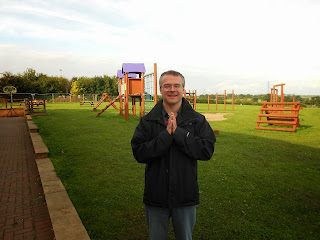When we talk about autism and Asperger's Syndrome in general conversation, one of the areas we tend to focus on extensively is children and young people. Though we may also touch on issues that affect adults on the autistic spectrum, particular those that either 'hot-topic' or 'flavour of the month' such as employment and levels of awareness of autism within adult services, but what we often forget about is autism in later life, something we are all subject to.
At conference I attended at Newcastle University on ASC Lifecourse and Ageing this week, I was introduced to some research on how adults on the autistic spectrum are likely to be affected in later life, as well as how it also affects those around them, especially their immediate family. The themes talked about at the conference went even further than old age to something that inevitably comes to us all, death. Death and old age were two aspects of life, along with sickness that Prince Siddhartha saw when he was eventually allowed go outside the palace in Lumbini, in present-day Nepal, where after having been brought up with every advantage and luxury he could have had for the standard of his time, he realised that despite being a prince, sickness, old age and death would come to him also. But Prince Siddharta also saw a fourth sight, that of an ascetic (a contemplative monk or holy man), who had devoted his life to finding the cause of suffering. After feeling that he could also be released from suffering of being repeatedly born, Prince Siddharta decided to follow the ascetic's example, giving up worldly existence in pursuit of enlightenment, which, as traditionally the story goes, he eventually attained in Bohd Gaya, India, around 2,500 years ago under the Bodhi tree after which he became know as The Buddha, passing on his teachings.
Two-and-a-half thousand years later, values related to the Buddha's teaching still have much relevance to present-day life, in both a spiritual and secular context, including when it comes to coping with later life on the autistic spectrum. In a presentation on this theme,
Hilde Geurts, a neuropsychologist at Amsterdam University, described how her research suggested that while adults on the autistic spectrum don't often experience much physical differences to people not on the autistic spectrum in later life, they are perhaps more likely to experience higher-level stress and anxiety, possibly related to worrying about how long one may have left to live. This is where tuning into the present through mindfulness practice, including meditation techniques similar to those practised in Buddhism, can help one make the most of their life, including in old age, by tuning into the present moment.
 |
| Throssel Hall, a Zen monastery in Northumberland |
According to Buddhist teaching, particularly in the Zen tradition, everything exists together in a moment. In the context of a life narrative, including living with Asperger's Syndrome, individual moments and phases throughout one’s
life continuum rarely occur in isolation, as the many individual moments and
phases often have to happen not just for the next moment to happen but for
one’s life to unfold as a continual now. Those who were diagnosed with Asperger’s Syndrome later in
life, including myself, will likely appreciate that certain events or periods
in their life had to happen, such as depression, low self-esteem maybe had to
happen form one to both seek and obtain a diagnosis. The moment-to-moment
awareness emphasised in mindfulness practice, enables one to be present with each moment as it unfolds. The more we live in
each moment as it unfolds, the more we can begin to open up to our life being a
continuum, where each moment, good or bad, pleasant or difficult is absorbed
into one continual moment.
 |
| Inuit drum dancer Anda Kuitse |
Earlier this year I found that even beyond the influence of Buddhism, becoming accustomed to living in the present can enable communities to make the most of now, including in Kulusuk, Greenland, from which readers may remember a description of in previous entries here. Life for inhabitants of the remotely-located Kulusuk on Greenland's east coast can be harsh, especially during winter. As a result, life expectancy is only around 50 years for many Native Greenlanders (Inuit). Similar to the Tibetans and Sherpas, who live in similarly harsh conditions, the Inuit have become accustomed to a 'living for now' mentality. During my visit to Kulusuk, Inuit drum dancer Anda Kuitse, who in his sixties had already outlived local life expectancy by a decade, performed a very powerful and inspiring piece called
An Ode to Nature, in which he reminded us that we need not be afraid of nature as the present is the only time we have to live.
In the case of living with Asperger's Syndrome, I feel that whichever stage of our life we are at chronologically, the more we are present with each moment as it unfolds allows us to make the most of our lives in relation to the strengths and qualities that the condition may present, while opening up to some of the more difficult aspects, including depression. I look forward to continuing working with Newcastle University on this eye-opening and potentially important project as it unfolds.
I am due to fly out to Tanzania for my Kilimanjaro challenge in aid of the Daisy Chain project, supporting families affected by autism, on September 29th 2013. Donations can still be made at my sponsorship page at http://www.justgiving.com/Chris-MitchellGNR/
Elsewhere,at Autism Works we would like to pay our respects to those who tragically lost their lives during the 9/11 attacks as well as their families twelve years on.





